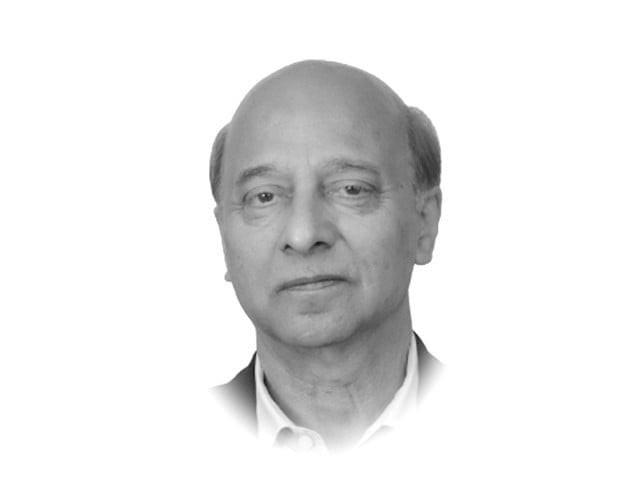The 26th amendment and misleading mutual felicitations
Pakistan's political landscape faces turmoil as abductions and coercion undermine democracy and judicial independence.

On Oct 21, Pakistan witnessed another low in its wobbly politics. The circumstances around the 26th constitutional amendment sounded like a regression accompanied by false claims of absolute numbers required for the legislation by PML-N and PPP leaders, and deceptive brinkmanship by Maulana Fazlur Rehman.
Chief Justice Qazi Faiz Isa and his colleagues on the bench had levelled the ground for floor-crossing through their ruling on the article 63A, yet Prime Minister Shehbaz Sharif and his potential successor Bilawal Zardari still needed to get a few more members on board. To get those numbers, they literally allowed the alleged abduction or forced disappearance of a few members that belonged to Balochistan National Party (BNP) and the PTI, not to mention a couple of members of the JUI-F as well, as reported by Maulana Fazlur Rehman.
The details of the deal with the maverick Maulana - as of now - remain elusive, yet the JUI-F's ascent to the 26th amendment served as the biggest facilitator for clipping the wings of the superior judiciary. No surprise the International Commission for Jurists (ICJ) denounced it as a "blow" to the independence of the judiciary.
Appointments, dismissals and suspensions within the third pillar of the state i.e. the judiciary are now literally at the mercy of the prime minister and the ruling coalition's sweet will. No suo motu any more, nor any legal challenge to the PM's advice to the president admissible in any court any longer.
The cacophony of celebrations and the mutual felicitations by Sharif, Bilawal, their yes-men and their accolades for the Maulana sounded ridiculously superficial to the context of allegations of coercion, abductions and bribes.
All those who celebrated the passage of the 26th amendment - politicians, journalists, anchors, etc - practically normalised brutality and abductions.
"This can't be a new normal for democracy and democratic evolution in this country where you are normalising the assumption that abductions and vote-buying are part of any legislative exercise and that those who differ with the scheme may imperil lives of family members - illegal raids on homes, detentions, harassment of family women, abduction of sons and daughters," wrote an upset Pakistani Political Science scholar based in Australia.
While accolades for the ruling coalition and its allies would have made sense in a somewhat functional democracy, congratulating them for a process that allegedly involved human rights violations and abductions makes little sense.
The question, therefore, remains: how can any democratic intellectual shower praise on Bilawal Zardari or Sharifs or even Maulana for having been part of a move that involved alleged torture, arrests and abductions - a move carried out with the mala fide intent to subordinate the superior judiciary to the whims of the prime minister and his comrades?
The larger issue is the assumption that abductions, coercion and bribery are part of critical future legislation, with the focus only on the written political process. How is the objective, that was achieved, deemed relevant by most of the intelligentsia, particularly those aligned with personalities or parties of their liking?
The entire status quo leaders kept blaming the PTI for "U-turns and its unwillingness to negotiate" the amendment deal, yet the basic question that agitates sane minds is whether the PTI should and could have negotiated in a situation wherein the family members of their leaders were not safe, even in their own homes.
Throughout the process, a section of Pakistani intellectuals and anchors kept criticising the PTI for not being part of this "constitutional process". Yet, the question that very few asked was: what forced to the PTI into taking this position?
Their leader, Imran Khan, is in jail, and so are his sisters. Some of the renowned Khan loyalists, too, are either in jail in Punjab or in hiding in the KP. The party is yet to receive its share of reserved seats in the parliament, in sheer violation of the Supreme Court order. The Senate is still without representation from Khyber-Pakhtunkhwa. How can an incomplete house enact a constitutional amendment?
Ironically, this whole context is not written in the Constitution nor in statute books, but Justice Qazi Faiz Isa and the likeminded judges still wanted to go by the book - as if the PTI had a free run in the entire process. No surprise that eight judges of the Supreme Court adjudicated the PTI seat issue taking into account the ground situation and not just what the law says.
However, the way the situation was discussed in Pakistan's mainstream media only exposed the "both-siding" of the issues by most intellectuals - either motivated by personal commercial interests or under instructions.
Several discussions on primetime talk shows offered blatant attempts to balance criticism of the ruling coalition with a reminder of similar things happening during the PTI government's tenure.
How can thinking people normalise the massive electoral fraud of February 8? Should the response to that manipulation through Form 47 be acceptance as fait accompli? How does it justify the wrongdoings during the 2024 election?
Analysts and anchors kept switching the blame between the PTI and the judiciary, criticising it for over-reach on issues of national interest. They never called out the ruling coalition's intent or the timing of the amendment, and thus became indirect facilitators of the assault on the independence of the judiciary.














COMMENTS
Comments are moderated and generally will be posted if they are on-topic and not abusive.
For more information, please see our Comments FAQ